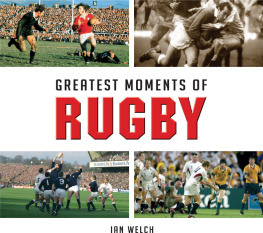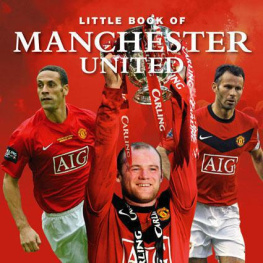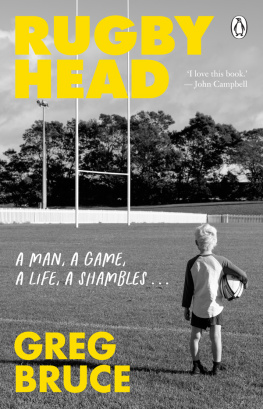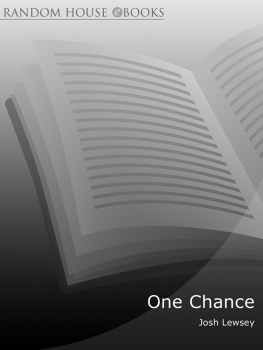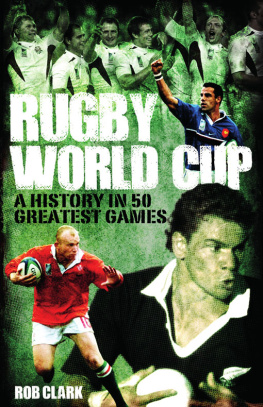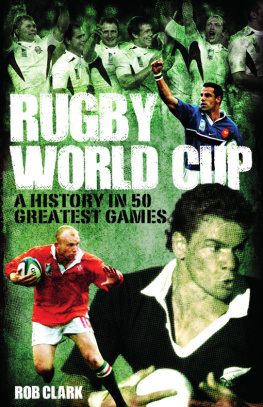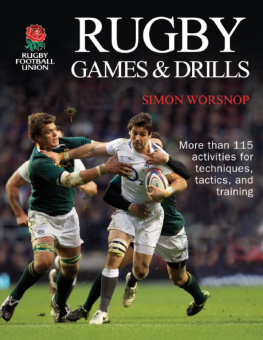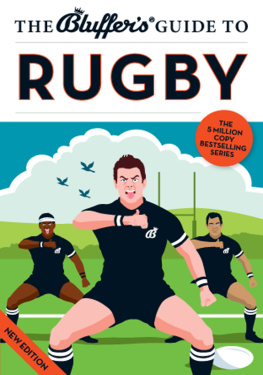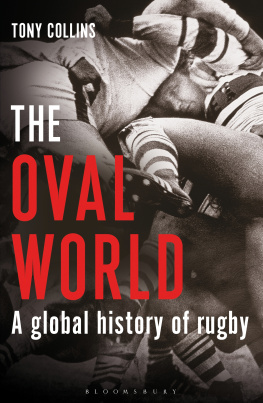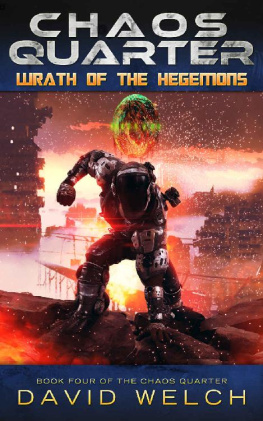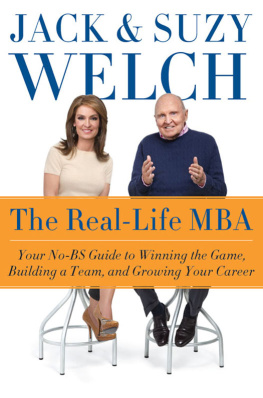Ian Welch - Greatest Moments of Rugby
Here you can read online Ian Welch - Greatest Moments of Rugby full text of the book (entire story) in english for free. Download pdf and epub, get meaning, cover and reviews about this ebook. year: 2008, publisher: G2 Rights Ltd, genre: Home and family. Description of the work, (preface) as well as reviews are available. Best literature library LitArk.com created for fans of good reading and offers a wide selection of genres:
Romance novel
Science fiction
Adventure
Detective
Science
History
Home and family
Prose
Art
Politics
Computer
Non-fiction
Religion
Business
Children
Humor
Choose a favorite category and find really read worthwhile books. Enjoy immersion in the world of imagination, feel the emotions of the characters or learn something new for yourself, make an fascinating discovery.
- Book:Greatest Moments of Rugby
- Author:
- Publisher:G2 Rights Ltd
- Genre:
- Year:2008
- Rating:3 / 5
- Favourites:Add to favourites
- Your mark:
- 60
- 1
- 2
- 3
- 4
- 5
Greatest Moments of Rugby: summary, description and annotation
We offer to read an annotation, description, summary or preface (depends on what the author of the book "Greatest Moments of Rugby" wrote himself). If you haven't found the necessary information about the book — write in the comments, we will try to find it.
Greatest Moments of Rugby — read online for free the complete book (whole text) full work
Below is the text of the book, divided by pages. System saving the place of the last page read, allows you to conveniently read the book "Greatest Moments of Rugby" online for free, without having to search again every time where you left off. Put a bookmark, and you can go to the page where you finished reading at any time.
Font size:
Interval:
Bookmark:
GREATEST MOMENTS OF
RUGBY
First published in the UK in 2007
G2 Rights 2014
www.g2ent.co.uk
All rights reserved. No part of this work may be reproduced or utilised in any form or by any means, electronic or mechanical, including photocopying, recording or by any information storage and retrieval system, without prior written permission of the publisher.
ISBN 978-1-782812-62-3
eISBN 978-1-782819-75-2
The views in this book are those of the author but they are general views only and readers are urged to consult the relevant and qualified specialist for individual advice in particular situations.
G2 Rights hereby exclude all liability to the extent permitted by law of any errors or omissions in this book and for any loss, damage or expense (whether direct or indirect) suffered by a third party relying on any information contained in this book.
All our best endeavours have been made to secure copyright clearance for every photograph used but in the event of any copyright owner being overlooked please address correspondence to G2 Rights, Unit 7-8, Whiffens Farm, Clement Street, Hextable, Kent BR8 7PQ
While the British Lions had registered two previous victories over the New Zealand All Blacks 6-3 in June 1930 and 9-6 in September 1959 the 34-man squad that ventured to the southern hemisphere in 1971 was to surpass all expectations.
Although combined British and Irish teams had participated in unofficial tours of Australia and New Zealand since 1888, it was not until 1930 that the Lions officially engaged the All Blacks on their home turf. The first Lions tour with players selected from all four Home Nations took place in South Africa in 1910 but it was not until the inter-war years that the team became known as the Lions, so named after the crest on their jerseys.
Coach Carwyn James built the core of the team around the backbone of the Wales side that had won that years Five Nations Grand Slam with John Dawes, JPR Williams, Gerald Davies, Mike Gibson, Gareth Edwards and Barry John appearing in all four Tests. In total, 14 Welshmen were selected for the squad, with eight from England and six each from Scotland and Ireland.
In the early stages of the first Test in Dunedin, scrum-half Gareth Edwards limped off to be replaced by fellow Welshman Ray Chico Hopkins who went on to play out of his skin. The first points of the game came when the Lions won a line-out and the ball eventually found its way into the hands of John Bevan, who crashed through the New Zealand defence before spilling the ball. When Alan Sutherland attempted to clear his line, Scottish loosehead prop Ian Mighty Mouse McLaughlan was there to charge the ball down and claim a try for the visitors. Although fly-half Barry John failed with the conversion, it was his kicking that kept the tourists in the game. As well as helping relieve the pressure on his defence with quality balls down the line, he successfully kicked two penalties to give the Lions a 9-3 victory after full-back Fergie McCormick had equalised for New Zealand with another penalty kick.
The second Test, a fortnight later, saw the All Blacks gain revenge for the opening defeat with a 22-12 triumph although the Lions scored a classic try when full-back JPR Williams collected a high New Zealand clearance deep in his own half. Immediately launching a counterattack, Williams found Gibson in support who in turn laid the ball off to Gerald Davies. The winger sprinted 25 yards to the line to round off a textbook manoeuvre. Not to be outdone, the All Blacks flanker Ian Kirkpatrick broke from a maul near the half-way line and pounded his way to the line, evading all attempts to stop him.


Winning the toss at the start of the third Test in Wellington, the Lions decided to play with the wind in the first half and that would prove to be an inspired decision. Within minutes, the Lions turned over the All Blacks who had won a line-out near their goal-line and Gerald Davies scored the first try of the game. Minutes later, a line-out in nearly the same position on the right wing was palmed down by John Taylor into the path of Gareth Edwards. He jinked past a couple of New Zealand challenges before handing the ball to Barry John for an easy try by the post. With John converting the two tries and adding a drop goal, the score at the end of the first half stood at 13-0 to the Lions. In the second half, the Lions restricted the All Blacks to one try, scored by full-back Laurie Mains. This victory meant that the Lions could not now lose the series and had everything to play for in the fourth and final Test.
Things started well for the All Blacks in Auckland when Wayne Cottrell powered over the line to score the first try of the game. Main successfully kicked the conversion and added a penalty to give the home side an 8-0 lead. But the Lions were not out of the contest and flanker Peter Dixon reduced the deficit, scoring a try just before half-time with Barry John restoring parity with the conversion and a penalty by the interval.
Shortly after the game had restarted, John gave the visitors the lead with another penalty before Tom Lister scored the All Blacks second try to level the scores at 11 apiece. It was full-back JPR Williams who stunned the watching world when he attempted a drop goal from just inside his opponents half. The 45-yard kick flew straight between the posts and for the last 25 minutes the Lions were forced to defend against the All Black tide. As it turned out, the only score they could add was a Mains penalty to level at 14-14 and the visitors rejoiced at the end of the match, having won the series 2-1.
It is hard enough for an international side to beat the mighty All Blacks, let alone a club side. So when Welsh club Llanelli took on New Zealand on 31 October 1972, few were predicting that the visitors would do anything other than emerge victorious.
New Zealand had recently registered a hat-trick of wins over a touring Australia side and hadnt lost a match on tour since they were beaten 17-20 by South Africa in Johannesburg more than two years previously. Indeed, their 1972 tour of North America, the British Isles and France had got off to a spectacular start with convincing victories over British Columbia (31-3), New York Metropolitan (41-9) and Western Counties (39-12).
Llanelli were coached by Carwyn James, their former fly-half and the man who had masterminded the British Lions successful tour of New Zealand the previous year. James, born the son of a coalminer in 1929, was a Welsh international who had played two games for his country in 1958 but who would undoubtedly have won more caps if Cliff Morgan hadnt been the resident fly-half. James was a strong believer in the old adage that attack is the best form of defence and he instilled an attitude in his teams that once they got hold of the ball they should go on the offensive. Off the field, James stood as a Plaid Cymru candidate in Llanelli in the 1970 General Election and the BBC Wales Sports Personality of the Year Award has since been named in his honour.
With a 1967 victory against Australia already under their belt, Llanelli welcomed a crowd of more than 20,000 to Stradey Park a stadium that will be covered with 400 houses after 2007 to witness what would turn out to be a Halloween spectacular. It seemed as if the whole town had shut down for the afternoon.
The team line-up that day was: Roger Davies, John J Williams, Roy Bergiers, Ray Gravell, Andy Hill, Phil Bennett, Chico Hopkins, Tony Crocker, Roy Thomas, Barry Llewellyn, Delme Thomas, Derek Quinnell, Tom David, Hefin Jenkins and Gareth Jenkins.
Next pageFont size:
Interval:
Bookmark:
Similar books «Greatest Moments of Rugby»
Look at similar books to Greatest Moments of Rugby. We have selected literature similar in name and meaning in the hope of providing readers with more options to find new, interesting, not yet read works.
Discussion, reviews of the book Greatest Moments of Rugby and just readers' own opinions. Leave your comments, write what you think about the work, its meaning or the main characters. Specify what exactly you liked and what you didn't like, and why you think so.

